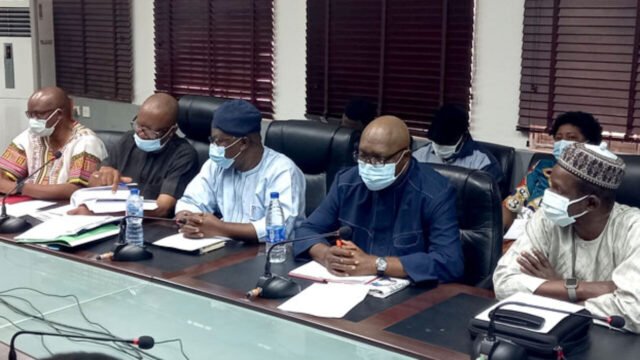The Federal Government of Nigeria has inaugurated an expanded negotiation committee to engage the Academic Staff Union of Universities (ASUU), the Non-Academic Staff Union of Educational and Associated Institutions (NASU), and other university-based unions in a bid to prevent a looming nationwide strike that could cripple the education sector.
The move, announced in Abuja by the Minister of Education, Dr. Tunji Alausa, comes amid growing tension between the government and university unions over unmet demands, unpaid arrears, and unresolved welfare concerns. The development marks what the government describes as a fresh and inclusive approach to dialogue and conflict resolution within the tertiary education system.
According to Dr. Alausa, the new committee represents a unified and coordinated negotiation structure that seeks to eliminate the fragmented, union-specific talks of the past. “We said enough of isolated dialogues,” he remarked during the inauguration. “This committee will harmonise all ongoing and future negotiations to ensure transparency, fairness, and continuity. Every stakeholder in the education system now has a voice at the table.”
He further revealed that the expanded committee is made up of representatives from the major tertiary education unions, the Federal Ministry of Labour and Employment, and other critical agencies. The committee, he said, has been provided with a functional secretariat to support its work, with the first official meeting scheduled for October 7, 2025.
Dr. Alausa emphasised that President Bola Tinubu personally approved the expansion, aligning it with the Renewed Hope Agenda to stabilise Nigeria’s education system. “The President has made it clear—our children must remain in school. We cannot afford another strike at a time when Nigeria is investing heavily in education reform,” he stated.

Table of Contents
A New Tone of Collaboration and Unity
The inauguration, held at the Federal Ministry of Education headquarters, drew applause from stakeholders who have long called for a more holistic approach to resolving disputes in Nigeria’s tertiary institutions. The Minister of Labour and Employment, Mohammed Maigari Dingyadi, praised the education ministry’s decision to widen the negotiation structure, describing it as “a step toward lasting industrial peace.”
According to Dingyadi, the newly inaugurated committee’s mandate goes beyond firefighting. Its task is to create a sustainable model for continuous dialogue between the government and the unions. “Industrial peace can only be achieved through inclusivity, fairness, and mutual trust. The days of reactive intervention must end,” he said.
He also reaffirmed President Tinubu’s commitment to peaceful dispute resolution through negotiation, dialogue, and consultation rather than confrontation. “We must prioritise constructive engagement over strike actions,” he stressed. “Every union’s demand will be considered on its merit, and we are committed to working through the challenges together.”
The chairman of the expanded committee, Alhaji Mahmud Yayale Ahmed, who once served as the Secretary to the Government of the Federation, expressed appreciation to the Federal Government for the trust placed in the committee. He promised to lead with integrity, inclusiveness, and transparency. “We understand the weight of this responsibility. Our goal is not merely to reach agreements, but to craft recommendations that are realistic, fair, and sustainable,” he assured.

Unions’ Expectations and the Road Ahead
The timing of the inauguration is critical. ASUU and NASU have both issued strong warnings in recent weeks, citing government’s delay in addressing critical issues such as unpaid salary arrears, withheld allowances, revitalisation funds, and poor working conditions across Nigerian universities.
ASUU President, Prof. Emmanuel Osodeke, recently warned that the union’s patience was running out, adding that members were tired of promises without concrete action. NASU has also complained of neglect and disparity in treatment between academic and non-academic staff, urging the government to adopt a more equitable approach.
The expanded negotiation committee’s success will largely depend on its ability to balance these competing demands and deliver results quickly. Stakeholders say the committee must prioritise trust-building measures, given the years of tension and mistrust between unions and government representatives.
Education analysts have described the government’s move as timely and potentially transformative, provided the committee is allowed to operate with independence and sincerity. Dr. Olayemi Adegbite, a public policy expert, noted that “the past negotiation models were too narrow and reactive. This new committee could be a turning point—if the government follows through with implementation.”
A Crucial Test for the Tinubu Administration
For students and parents across Nigeria, the announcement has brought a measure of relief—though many remain cautiously optimistic. Years of repeated strikes have disrupted academic calendars, delayed graduations, and eroded public confidence in Nigeria’s tertiary education system.
Observers say this expanded negotiation initiative is a crucial test for the Tinubu administration’s ability to manage labour relations within the education sector. The President’s Renewed Hope Agenda has emphasised human capital development, with education placed at the heart of national growth.
However, analysts caution that the government’s success will depend not just on committee meetings, but on the actual implementation of agreements reached. “Dialogue is important, but delivery is the real measure,” said Adegbite. “The unions want to see action—timely payments, improved facilities, and genuine reform.”
If effectively managed, the expanded negotiation committee could serve as a model for addressing broader labour challenges across sectors. But if it fails, the risk of renewed industrial unrest looms large, potentially reversing recent progress in stabilising the education system.

As the committee prepares to begin its work, the expectations are clear: fairness, transparency, and tangible outcomes. For millions of Nigerian students, lecturers, and non-academic staff, the hope is that this time, dialogue will not just be talk—it will bring lasting peace to Nigeria’s campuses.
Join Our Social Media Channels:
WhatsApp: NaijaEyes
Facebook: NaijaEyes
Twitter: NaijaEyes
Instagram: NaijaEyes
TikTok: NaijaEyes
READ THE LATEST EDUCATION NEWS








































